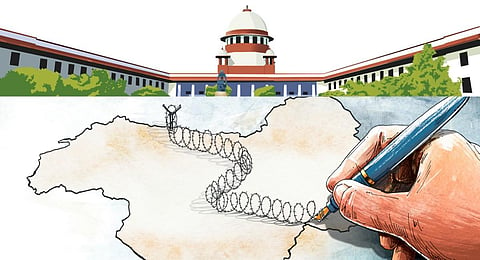

NEW DELHI: The Supreme Court will pronounce the verdict on December 11, Monday, on a batch of petitions challenging the August 5, 2019 decision of the Union government to scrap special status under Article 370 to J&K and bifurcating the state into two UTs - J&K and Ladakh.
The five-judge Constitution bench of the Apex Court, headed by the Chief Justice of India (CJI) Dr Dhananjaya Yeshwant Chandrachud, and also comprising Justices Sanjay Kishan Kaul, Sanjiv Khanna, B R Gavai and Surya Kant, will pronounce the verdict.
The Apex Court’s last working day before the winter vacation is December 15, Friday and Justice Kaul is set to retire on December 25. Hence there is speculation that the verdict will be given in a week.
The New Indian Express Newspaper spoke to 3-4 petitioners and lawyers, who were quite hopeful that the Apex Court would pass a verdict which would be beneficial for them.
Lawyer and also one of the petitioners, Muzzafar Iqbal Khan, said that the decision of the Apex Court is going to be a historical decision.
"The question before the Supreme Court would be the scope and sweep of the parliament power under Article 3 of the constitution to disintegrate a state. This question is going to have long-term repercussions on Indian polity, Since it is for the first time the Supreme Court will decide this issue, as never before in independent India, ever any state was reduced to union territory," Khan told the NIE.
It is to be noted that an Apex Court judge who completely hears a case shall have to deliver the judgement before his or her retirement.
It is also a fact that during any vacation -- summer and winter-- or offs of the Top Court, it did not deliver any verdict or order, making it a noteworthy thing to believe that the Article 370 verdict should be coming before December 16.
Justice Kaul, the second seniormost judge of the Supreme Court, after the Chief Justice of India (CJI) Dr Dhananjaya Yeshwant Chandrachud, is set to retire on December 25, Monday, after serving the Top Court from February 17, 2017, for 6 years 10 months and 10 days.
The Supreme Court had started the hearing on a day-to-day basis from August 2, 2023, for 16 tumultuous marathon hearings, on a batch of 23 petitions till September 05, 2023, challenging the Constitutional validity of changes made to Article 370, which gave special status to the erstwhile state of J&K and its reorganisation into Union Territories of J&K and Ladakh.
The five-judge Constitution bench of the Apex Court, headed by CJI Dr Chandrachud, and also comprising Justice Kaul, Justices Sanjiv Khanna, B R Gavai and Surya Kant, had reserved its judgement on September 05, 2023, after hearing 23 pleas challenging the abrogation of Article 370.
The Court had heard from all the parties, including the petitioners, Govt of India (Respondent) and others, before reserving the verdict on September 05, this year.
There are 23 petitions filed before the Top Court challenging the August 5, 2019 decision of Union government to scrap special status under Article 370 to J&K and bifurcating the state into two UTs - J&K and Ladakh.
The Attorney General (AG) of India, R Venkataramani and Solictor General (SG) Tushar Mehta - Top and senior law officer of the Union of India (UOI) respectively -- had submitted that though the centre had filed an additional affidavit setting out the central govt view on post notification development, it would have no bearing on the constitutional question and it would not be relied upon.
The Centre had defended its decision before the Apex Court to abrogate Article 370 from J&K saying that post the abrogation, street violence, which was engineered and orchestrated by terrorists and secessionist networks has now become a thing of the past.
"Since 2019, when Article 370 was abrogated, the entire region has witnessed an unprecedented era of peace, progress, brotherhood and prosperity," the Centre claimed before the Supreme Court, through its affidavit.
It said that the dilution was necessary to completely integrate J&K into the Union of India. The government made it clear to the Apex Court that the Valley has prospered in the past four-and-half-years, after the abrogation of Article 370 in August 2019.
Mehta said that the central government is always for national integration. "People's betterment is being taken care of by the Centre with this abrogation of article 370," he said.
Mehta also added that youth, which used to be employed by terror groups, inimical to India, are employed gainfully, after the abrogation of Article 370.
Opposing the submissions of the Centre, the petitioners had argued that Article 370 had assumed a permanent character as soon as the J&K Constituent Assembly dissolved in 1957, after the framing of the State Constitution.
One of the petitioners, Mr Khan, said Article 368 (Parliament's power to amend the Constitution) did not apply to Article 370.
Khan argued that it was not for the betterment of people of J&K, and the abrogation of Article 370 should be quashed by the Apex Court.
He further stated that Article 370 carved out an area for J&K which was not in sync, with the general federal features of the Indian Constitution for the rest of the country. While Kashmir has gone through some tough times in history, with the abrogation of Article 370 it was felt like Kashmir has been exiled from itself.